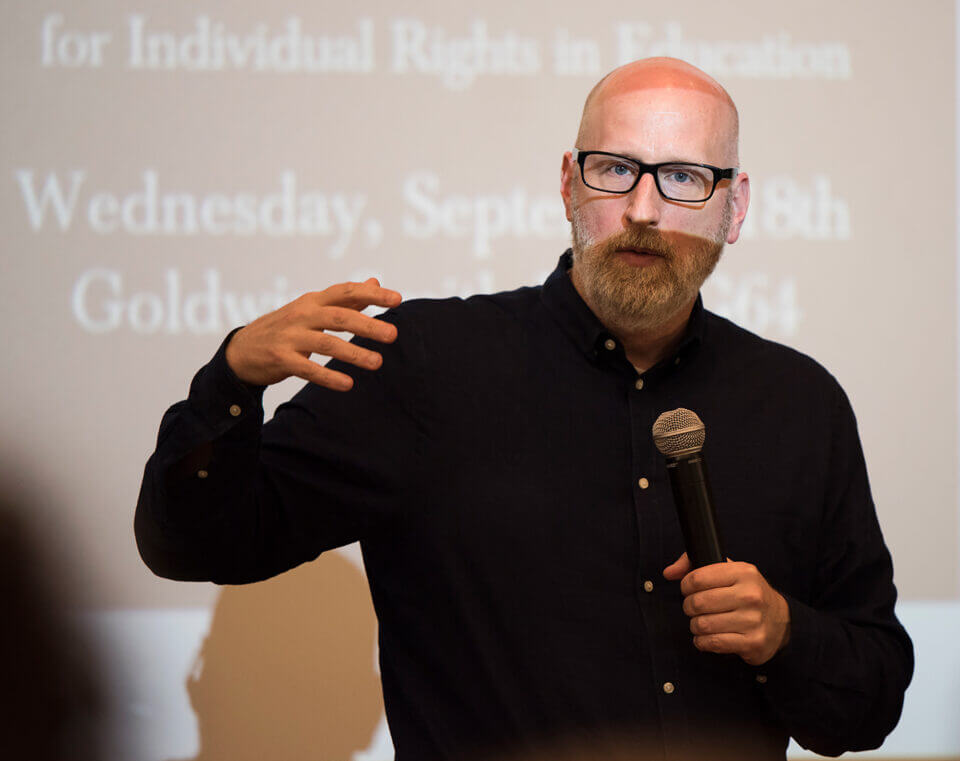
“French dedicates his book to James Madison, saying, ‘May we remember that you were right.'”
In the leadup to the 2020 election, the Democratic Party and many thought leaders on the Left were thinking big. Their proposition, supported by the polling, was that the electorate’s repudiation of President Donald Trump would usher in Democratic dominance—the Democrats would expand their majority in the House, overtake Senator Mitch McConnell’s GOP majority in the Senate, and of course, win back the White House.
With President Trump trounced and a historic mandate in hand, the party was going to pass more Coronavirus (COVID-19) relief and then shift to large-scale institutional reforms that would make American government more democratic (in both the lower-case and upper-case sense of the word). The blue wave would usher in blue dominance. In the words of The Week’s Damon Linker, the Democrats “wanted to lead a moral revolution, to transform the country—not only enacting a long list of new policies, but making a series of institutional changes that would entrench their power far into the future.” Court packing was on the table. Statehood for Washington, D.C. and Puerto Rico was on the horizon. The Senate filibuster’s days were numbered. All the while, Democratic gains in state legislatures would help create a friendlier electoral map as districts would be redrawn this term.
Little of this is going to happen. It looks like the Democrats are going to lose, not gain, seats in the House while keeping their majority. The GOP will very likely retain its Senate majority. The Democrats will take back the White House (barring any surprises), but as The Atlantic’s Ronald Brownstein put it, “nothing about the results suggests that [Joe Biden] has decisively broken America’s national stalemate.” In short, we are not witnessing the dawn of a new era of Democratic dominance in which the Republican Party is vanquished and thereby punished for its embrace of the ever flawed and eminently divisive figure of Donald J. Trump. Rather, thanks in large part to the power of negative polarization, we are getting more of what we have had for quite some time now: divided government.
The question, then, is simple enough: Will divided government bear fruit? And if so, how?
Although divided government has coincided with gridlock and mutual contempt between partisans in the recent past, it need not be that way. One can imagine divided government translating into compromise and progress on points of agreement between Democrats and Republicans at the federal level, coupled with a devolution of more divisive policy debates down to more homogeneous state and local levels of governance. In short: compromise where we can, devolve where we cannot.
David French’s recent book, Divided We Fall: America’s Secession Threat and How to Restore Our Nation, provides a cogent case for why we must devolve power and better cope with our reality of deep partisan division—a reality that does not seem to be fading anytime soon. A former National Review writer who currently writes for both TIME and The Dispatch, French begins his book with a stark warning: “It’s time for Americans to wake up to a fundamental reality: the continued unity of the United States of America cannot be guaranteed.” Americans are growing farther apart from one another in just about every way possible, and, as University of Maryland political scientist Lilliana Mason has persuasively argued, the two major political parties are increasingly capturing these geographic, cultural, and social divisions. Our myriad, deep-seated divisions are gaining coherent political voices. We have the means for organizing around our points of mutual contempt, and they are called parties.
What is most troubling here is not simply the divisions themselves, though, but that both the Left and the Right have developed competing narratives that frame the other side as a fundamental threat to their own side’s way of life. Partisan, religious, and geographic polarization does not have to translate into contempt and a sense of mutual threat, but, unfortunately, it often does. French writes: “At the core of each narrative is the burning conviction that the other side doesn’t just want its opponents to lose political races, but rather wishes for them to exist in a state of permanent, dangerous (perhaps even deadly) subordination.” Coming from French, an Iraq War veteran, this is a worrisome assessment of American politics. He notes that both the Sunnis and Shiites he encountered while serving in Iraq “each…had [their] own substantially true narrative of grievance and atrocity,” and, over time, “the conflict itself thus became reason enough for sustaining the conflict.”
The fight became the fuel for the fight. How absurd, yet how familiar. Our fabricated culture war over mask wearing in the age of COVID-19 is just one example of how we have reached the point where partisan clashes are no longer mere externalities of fallible human beings proposing differing visions for their polity’s future. As The Dispatch’s Jonah Goldberg wrote with regards to the Right’s blowup over COVID-19-induced mask wearing back in May: “The culture war has become more important than the issues the culture is supposed to be about…some people really just like the culture war while not caring that much about the issues that define it.”
When the rationale for such passionate disagreement fades (and passionate disagreement for the sake of passionate disagreement remains), it might be time to worry about the future of the polity.
For many within the American political arena, the fight itself (not the differing ideas supposedly informing it) has become the very essence of politics. Differences of opinion—and thus passionate political disagreement—are to be expected. As James Madison wrote in Federalist No. 10, “As long as the reason of man continues fallible, and he is at liberty to exercise it, different opinions will be formed. As long as the connection subsists between his reason and his self-love, his opinions and his passions will have a reciprocal influence on each other; and the former will be objects to which the latter will attach themselves.” When the rationale for such passionate disagreement fades (and passionate disagreement for the sake of passionate disagreement remains), it might be time to worry about the future of the polity.
For French, these competing Right-Left narratives are grounded in powerful, tribal forces—namely, the power of identity (racial, religious, and cultural). Building off of this premise, he proceeds to trace how we have arrived at our reality of polarized politics and narratives of mutual threat. French lays out a story of geographic sorting coupled with fear of the “other.” He argues quite persuasively that the United States is now home to a number of geographically contiguous pockets where cultural fear of the other side is pervasive. Moreover, our discourse is fragmenting. The United States’ free speech culture has sorely weakened, and our two sides are “losing a common political language” (Look no further than how the meaning of the term “racism” varies depending on whether the Left or the Right is employing it).
In French’s telling, this mix of geographic polarization and competing narratives that frame the other side as a threat help to foster the sort of socio-political environment where national dissolution can become an actual possibility. He writes that the only as of yet unsatisfied condition to make secession possible (while, of course, far from guaranteeing it) is the transformation of cultural fears, backed up by competing narratives of threat, into veritable fears among one or both sides for their own lives. French proceeds to sketch out how exactly such a transformation could occur.
Having laid out the reality of our deep division, French proceeds to imagine how precisely it might devolve into dissolution. Seamlessly transitioning out of his political commentary into narrative fiction, French tells hypothetical stories of “Calexit” and “Texit.” Whether the impetus be a California state legislative attempt to confiscate guns in the wake of a mass shooting or Southern states’ resistance to Democrats’ attempts to expand and codify abortion rights at the federal level in the aftermath of the overturning of Roe, the would-be result is the same: A nation torn asunder, and without a united and strong United States serving as the source of stability like it has post-World War II, a world destabilized.
French’s proposed solution to stave off such nightmare secession scenarios is pluralism. According to French, “America was built from the ground up to function as a pluralistic republic. It can flourish only as a pluralistic republic.” Under pluralism, so long as they respect the constraints imposed by the Bill of Rights, state and local communities ought to be granted more leeway to govern themselves.
The only way out of our political morass is not through, in French’s telling. Rather, the only way out is, well, out: less weighty national stakes, more decisions of consequence being decided by like-minded partisans clustered within their local communities. As French writes, “The central idea of this book…is that, thanks to increasing geographic separation and group polarization, the ‘fight and win’ approach to the American divide won’t produce a permanent settlement but rather will result in more extremism and division—extremism and division that can lead to dangerous instability.”
Pluralism requires broad-based support for both the fundamental individual rights enshrined by the Bill of Rights and American communities’ rights to local self-governance. Thus, pluralism requires tolerance; if we are to allow different communities to govern themselves in accordance with their own values and belief systems, we will have to agree to disagree. Some communities are going to govern in ways that we do not like all that much. So long as local and state governments are not trampling upon bedrock constitutional constraints, we should allow them to continue carrying out the work of self-government. Hearkening back to George Washington’s favorite passage in the Book of Micah, French writes, “You have to embrace the idea that your fellow citizens—even those who disagree with you—should feel at home in this land.”
I wholeheartedly support French’s proposal to revivify American democracy’s commitment to pluralism, tolerance, and localism. That said, certain aspects of the logic of French’s proposal for a revivification of the Bill of Rights and federalism are worth exploring a bit more in detail. Fleshing out and even critiquing parts of French’s argument may, in fact, strengthen his case for devolving power away from the executive branch and the federal government.
French partially grounds his worries over partisans’ increasing geographic segregation (the oft-mentioned “big sort”) in the logic of Cass Sunstein’s 1999 paper, “The Law of Group Polarization.” As French puts it, the upshot of Sunstein’s argument in plain English is this: “when people of like mind gather, they tend to become more extreme.” Thus, the fact that more and more Americans are geographically segregating themselves into “landslide counties” is worrisome to say the least. Lacking everyday interactions with those standing across the political divide (and feeding on a daily diet of cable news and social media vitriol), Americans will be more apt to “other” their fellow citizens and perceive them as threats to their very way of life.
I do not dispute this logic, but it is worth asking ourselves whether group polarization would hold up over time within local communities when they are granted real governing power. Surely, the clustering of like-minded citizens can enhance the extremism of their views. But what happens when one gives this ideological cluster real power? What happens when one forces them to put their money where their mouths are?
At first, it is plausible that they will aim to codify their extremist views into law. However, reality has a way of asserting itself over time. As Jefferson wrote in the Virginia Statute for Religious Freedom, “truth is great and will prevail if left to herself.” More often than not, extremist positions are woefully detached from reality, the truth of our current situation.
Reality is complex. Extremism—on both the political left and the right—shunts aside nuance in favor of moral certainty and ideological purity. That mix of certainty and purity can maintain itself, even flourish, in settings where the real-world, immediate effects of the ideas in question are minimal—i.e., where the stakes are low and the truth of matters is barred from crashing down on the neat stories we may be telling ourselves. Academia presents one such setting but so do homogeneous communities that are lacking in any real governing power. If one gave the professors power, over time, my guess is that they might be forced to shed some of their most far out views. I think the same goes for everyday people and the local communities they inhabit.
My contention that the realities of self-government might, in fact, weaken the power of extremist views within local communities over time is not an original one. In Democracy in America, Alexis de Tocqueville argued that humans were most apt to disown their vague ideas lacking in nuance (a fair characterization of most extremist political positions) when routinely confronted with the material consequences of those very ideas. He wrote:
“Men who live in democratic countries are very avid for general ideas because they have little leisure and these ideas free them from wasting their time in examining particular cases; that is true, but it must be understood to be so only in matters that are not habitual and necessary objects of their thoughts…Therefore, when there is a subject on which it is particularly dangerous for democratic peoples to indulge in general ideas blindly and beyond measures, the best corrective that one can employ is to have them occupy themselves with it every day in a practical manner; they will then be forced to enter into the details, and the details will make them perceive the weak sides of the theory. The remedy is often painful, but its effect is sure.”
One of the best ways to allow men and women to “enter into the details” of public policy is to localize and, thus, concretize politics. When it is clear that their views have the potential to have real meaning—to have real effects on their own lives and the lives of their friends, families, and neighbors—Americans will be forced to reckon with the messy, nuanced reality of the issues at stake. “The remedy is often painful, but its effect is sure.”
In the long-term, devolving power might actually have the effect of diminishing the appeal and the prevalence of extremist political positions in American politics.
Therefore, reckoning with the possibility that Sunstein’s law of group polarization might not hold over time within a polity might strengthen French’s pro-devolution argument in the face of his would-be critics. If Tocqueville is correct, those uncomfortable with the long-term prospects of pluralism—those fearing the rise of extremist pockets throughout the United States—might be wrong to fret. In the long-term, devolving power might actually have the effect of diminishing the appeal and the prevalence of extremist political positions in American politics.
While this point strengthens French’s proposal, some further nuance might still be necessary. French dedicates his book to James Madison, saying, “May we remember that you were right.” French is correct to see his advocacy for more robust pluralism and his revivification of the Bill of Rights (Madison’s “crowning glory”) as an ode to the Constitution’s father, but we would be remiss to pretend that Madison was an unyielding advocate for decentralized governance. Madison was well aware of the “vices” of undue decentralization, and the Constitution he played such an instrumental role in drafting was, in comparison to the structure of government it replaced, “stunningly nationalist” in the words of Harvard Law’s Michael Klarman. Moreover, Madison’s own Virginia Plan was far more nationalist than the Constitution he and the other framers ultimately signed. Indeed, Madison’s devotion to pluralism was nuanced.
If we turn to Federalist No. 10, we find that Madison implicitly distinguished between matters where decentralization was preferable and where it was not. In short, the “extended republic”—i.e., a central level of governance—was best equipped to deal with bread-and-butter issues that arise from a complex, variegated modern economy. Multitudinous interest groups would form with respect to questions like tariff rates and economic regulations, thereby barring one single “faction” from domineering the public policy regime if these decisions were made at the national level.
21st-century America’s culture wars, however, are largely binary issues. Think of the debates over abortion rights, gun rights, and LGBTQ rights, for example. Rather than being issue areas where self-interest and livelihoods are at stake (thereby laying the groundwork for a whole slew of differing opinions to arise), these tend to be fraught moral questions of right and wrong that give rise to only two dominant factions. As such, the extended republic with its multitudinous factions is not particularly well-equipped to resolve such matters. Instead, they are best ironed out in smaller, internally homogeneous republics like states and localities—i.e., the sorts of republics that Montesquieu was writing about and that Madison’s Anti-Federalist foes favored.
Thus, it might be misguided to voice support for large-scale innovations by states in a policy sphere like health care, as French does. Article I Section VIII concerns aside, perhaps the extended republic (and, thus, the federal government) is best suited to call the shots when it comes to health care policy, broadly defined. Meanwhile, local communities should be empowered to govern themselves when it comes to the issues that really drive us into tribes—issues of identity and culture.
Making this distinction, as Madison did, would strengthen the logic of French’s argument, not to mention its appeal. After all, as the Democrats make sense of their somewhat disappointing election results this election cycle, they might be more willing to minimize their national focus on divisive issues of identity and double down on bread-and-butter, dollars-and-cents issues (at least when campaigning and governing on the national level).
These quibbles aside, David French has characteristically provided readers with a must read. Since neither side of our political divide is going anywhere, it is essential that we begin thinking seriously about how to hang together, as one, in the years to come. French has done a public service by laying out one such route for sustained national cohesion while pointing out that such cohesion is far from a given. Let us hope we heed his warnings.
Thomas Koenig is a recent graduate of Princeton University and will be attending Harvard Law School in the fall of 2021. He can be found on Twitter @TomsTakes98










